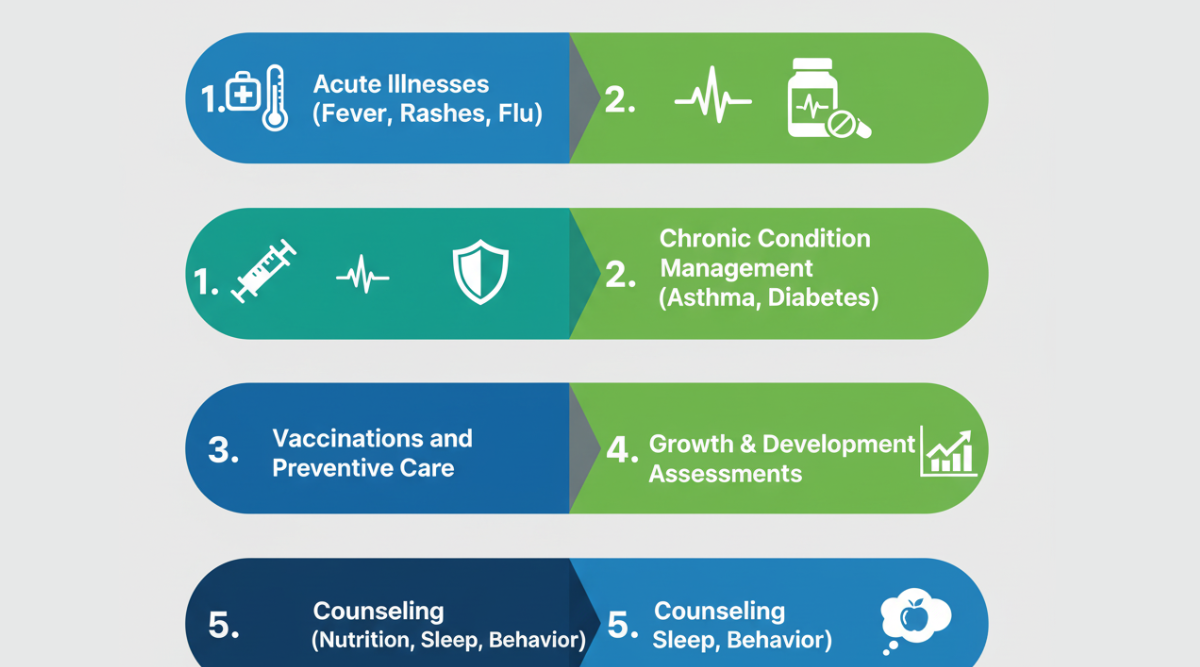Getting medical care for a child should feel comforting, not complicated. For many parents, this means looking beyond crowded waiting rooms and confusing commutes. With doctor-at-home pediatric care by Dr. Morepen Home, families find health support where children feel safest: at home. This service blends expert clinical attention with friendly, local trust. Every visit answers not just health worries - it aims to see each child as an individual, right in the setting they know best.
Why Parents Choose Doctor at Home Pediatric Care
Reducing Clinic Anxiety and Travel Risks
Stepping into a bright, sterile waiting area can frighten any child. Too often, travel to a clinic means tears, fatigue, and restless siblings. A home visit skips all that. Children relax in their own space, so doctors see the real picture, not just a “clinic version” of a child. Sick days no longer begin with stressful taxi rides or getting stuck in traffic.
Safety and Comfort in Familiar Surroundings
Children heal better when they feel at ease. Their own bed or preferred armchair is the backdrop for care. This reduces resistance, allows gentle observation, and ensures treatment adapts to family realities. Even small details - like choosing a favorite toy at hand - can make big difference in outcomes.

Avoiding Exposure to Infections
Waiting rooms are full of coughs and sniffles - parents worry about their healthy child catching something new. Doctor-at-home visits keep illness out. The home environment is controlled. For children with weak immune systems, this is more than a comfort - it’s a health strategy.
Support for Working Parents and Busy Schedules
Work doesn’t pause when a child falls sick. Home visits mean parents don’t have to skip meetings or rearrange entire days. Appointments fit around family rhythms, and caregivers stay productive while their children get well.
Personalized Care Tailored to Your Child
Doctors in the home can see how a child interacts, eats, plays, and rests - details that may get missed in a hurry elsewhere. Each care plan becomes personal, not generic. Families feel listened to, not just processed.
What to Expect from a Pediatrician Home Visit
Typical Services Provided
Parents can expect full check-ups, quick strep or flu tests, minor wound care, medication guidance, plus support for childhood illnesses and chronic conditions. At home, doctors spend the time needed without rushing, answering questions as they go.

How Examinations and Monitoring Are Conducted at Home
Pediatricians rely on portable kits, digital thermometers, and sanitized equipment. Observing a child in their natural setting sometimes gives more valuable clues than lab results alone.
Technology and Tools Used for Home Pediatric Care
Today’s doctors use portable devices for monitoring and record-keeping. Some services add telehealth follow-up via video call, making second opinions easy to arrange.
Communication with Your Regular Pediatrician
After each visit, a summary can be shared with the family’s primary doctor. This makes teamwork simple and helps parents avoid repeating histories or forgetting past advice.
Scenarios Best Suited for Home Visits
Not all problems need emergency rooms. Home care handles fever, minor rashes, coughs, ongoing asthma, and preventive checks. Life-threatening emergencies should always go straight to the hospital.
Key Benefits of Pediatric Home Care
Emotional and Psychological Advantages for Children
Children open up more when treated by a doctor who listens, in an environment that feels safe. This helps diagnose behavioral changes, anxiety, or subtle symptoms.
Greater Focus for Consultations and Parental Questions
Home visits give families one-on-one time. No distractions, no waiting for a nurse or rushing an exam - parents can ask everything on their mind.
Convenient Scheduling (Evenings/Weekends)
Flexible appointment slots, including evenings and weekends, keep life running. Parents appreciate knowing medical help fits their timetable, not the other way round.
Reduced Disruption to Family Routine
Daily routines don’t stop for medical care. Siblings stay busy, meals run on time, and nobody sits in a car for hours.
Fewer Hospital Readmissions and Complications
With monitoring and personalized follow-up, problems are caught earlier. This keeps kids at home, reduces stress, and builds healthier patterns.
How to Prepare Your Home for a Pediatrician Visit
- Set up a clean, quiet, and well-lit space for the exam
- Gather recent medical records, medications, and health logs
- Jot down symptoms, questions, and any changes in routine
- Limit background noise - consider turning off screens
- For vulnerable children, clean surfaces and provide tissues or sanitizer
Types of Conditions & Services Addressed
Acute Illnesses (Fever, Infections, Rashes)
A doctor at home can diagnose ear infections, manage viral fevers, and treat mild injuries. Prompt attention means fast relief and peace of mind.
Ongoing Chronic Condition Management (Asthma, Diabetes)
Children with long-term conditions need regular oversight. Home doctors set up medication plans, check devices, and coach parents in day-to-day management.
Vaccinations and Preventive Care
Many vaccinations can be given at home, keeping immunization schedules on track and removing another reason to visit busy clinics.
Growth and Development Assessments
A home setting helps professionals notice developmental progress - movement, speech, and behavior are easier to assess when a child is at ease.
Counseling for Nutrition, Sleep, and Behavior
Each child’s food, sleep pattern, and social behavior are unique. Home doctors tailor their advice, catching issues early and supporting healthy habits.
Choosing a Doctor at Home Service
Qualifications to Look For
Check for valid registrations, pediatric experience, and a history of clean, responsible care. Dr. Morepen Home ensures this through careful hiring.
Evaluating Experience with Pediatric Conditions
Ask if the provider has managed a range of conditions. Confidence comes from knowing your doctor has guided families like yours before.
Provider Responsiveness and Emergency Support
Look for quick booking, clear communication, and instructions for what to do if a condition suddenly worsens.
Reviews and Success Stories from Local Parents
Feedback from nearby families carries weight. Check for reviews and stories that resonate, focusing on honesty over hype.
Checking for 24/7 Availability
Flexible, round-the-clock support means parents don’t wait when a child is in need.
Transitioning from Hospital to Pediatric Home Care
Planning the Transition Process
Leaving the hospital is a major step. Families coordinate with care teams to ensure medicines, schedules, and post-discharge goals are clear.
Coordination between Hospital and Home Care Teams
Dr. Morepen Home works with hospitals and pediatricians, so children move smoothly from inpatient care to recovery at home.
Adjusting Care Plans for Home Setting
Certain routines change at home. Parents are shown how to adapt, keeping safety and comfort central.
Support for Parents Managing Post-Discharge Needs
Practical tips ease the burden—organizing medications, setting reminders, or finding community support.
Family Involvement and Education
Training Parents to Monitor Symptoms and Provide Support
Parents play a central role in successful home pediatric care. During each visit, doctors teach families how to watch for new symptoms, measure temperature accurately, and recognize when a complaint needs medical attention. This guidance empowers parents and gives them confidence in caring for their child between appointments.
Recognizing Early Warning Signs
Families receive simple checklists to identify common red flags. For example, changes in appetite, persistent fever, breathing difficulties, or listlessness. Knowing what to track helps families act quickly if things change.
Communication Tips with Healthcare Providers
Good communication helps prevent confusion. Home care professionals encourage parents to note questions before visits, ask for explanations, and follow up as needed. Keeping a health diary with symptoms and doctor advice keeps everyone on the same page.
Emotional Support and Counseling Resources
Emotional wellbeing matters as much as physical care. Children facing illness may feel scared or withdrawn, and parents sometimes need support too. Dr. Morepen Home provides resources and counseling contacts for families who want professional advice, stress management tips, or behavioral guidance.
Safety and Quality Assurance
Infection Control at Home
Safety protocols are essential. Doctors sanitize hands and equipment on arrival. Families are guided to keep surfaces clean and provide distilled water, if needed, for equipment. For children with high risk, extra measures like medical-grade filters or mask use may be suggested.
Ensuring Professionalism and Background Checks
Reputable home care providers conduct background screenings before sending doctors to a family’s home. Dr. Morepen Home shares credentials and service records, so parents always know who is visiting.
Regular Monitoring and Follow-Up Protocols
Scheduled follow-ups track progress. Doctors check in after treatment to answer questions and adjust care plans. This ongoing contact prevents gaps and supports recovery.
Handling Medical Records Confidentially
Families’ medical information is protected. All records - from visit summaries to prescriptions - are safely stored in secure systems, accessible only to authorized caregivers. Privacy policies are clearly shared to build parent trust.
Costs, Insurance, and Accessibility
How Home Visits Are Billed (Consultations, Packages)
Families receive clear estimates before booking. Single appointments, bundled packages, and specialized services come with defined prices. Home care removes hidden costs that surprise parents in clinics.
What Insurance May Cover
Many insurers now recognize pediatric home care as a reimbursable expense. Dr. Morepen Home helps parents with documentation and claims support, guiding families through the process step by step.
Understanding Out-of-Pocket Expenses
Transparent billing means parents know what’s owed before care starts. The absence of facility fees and waiting room charges often reduces costs compared to some clinics.
Assistance for Low-Income Families
For families under financial stress, Dr. Morepen Home shares information about subsidies, community help, and special payment programs. This keeps essential care within reach for all children.
Telehealth Add-Ons for Remote Advice
When a full visit isn’t needed, parents can book video or phone consults. Telehealth options save money and time for routine questions or guidance.
Future Trends in Doctor at Home Pediatric Care
Advances in Remote Monitoring Technologies
Home care in India is shifting towards smart devices: wearable monitors track temperature, pulse, and oxygen levels, sending updates to doctors in real-time. This lets parents act quickly if something changes.
Expansion of At-Home Diagnostic Tools
Modern portable test kits now allow doctors to check for infections, nutrition deficits, or allergies during visits, instead of sending children to clinics for lab work.
Telehealth Integration for Pediatric Services
Virtual consultations will keep expanding - routine follow-ups, nutrition advice, and second opinions will happen over secure calls. Dr. Morepen Home is already including options for parents who need remote guidance.
Community Outreach and Education Initiatives
Providers are running parent workshops, distributing checklists, and giving talks in local schools. These programs help prevent illness and support healthy habits before problems arise.
Frequently Asked Questions (FAQs)
Is doctor at home care as safe as clinic care?
Yes, when provided by licensed professionals following health protocols, home care offers the same standard of safety as clinics, with extra comfort for children.
What emergencies should never be handled at home?
Life-threatening issues - severe breathing difficulty, convulsions, or unresponsive behavior - should be treated in the hospital. Home care covers non-urgent medical needs.
Can regular vaccines be administered at home?
Most routine childhood vaccinations can be arranged at home. Parents should ensure vaccines are stored and handled correctly for effectiveness.
How do I prepare my child for a home doctor visit?
Let your child know what to expect in simple terms, gather favorite toys, keep medical records handy, and set up a clean, quiet spot for the exam.
Are pediatric home visits available after hours?
Providers like Dr. Morepen Home offer evening and weekend slots. Parents should request preferred times during booking.
.png)


.png)
.png)
.png)
.png)
.png)
.png)
.png)
.png)
.png)
.png)
.png)
.png)
.png)
.png)
.png)
.png)
.png)
.png)
.png)
.png)
.png)
.png)
.png)
.png)
.png)
.png)
.png)
.png)
.png)
.png)
.png)


.png)
.png)
.png)
.png)
.png)
.png)
.png)

.png)
.png)
.png)

.png)
.png)
.png)
.png)
.png)
.png)

.png)
.png)

.png)
.png)
.png)

.png)

.png)


.png)







